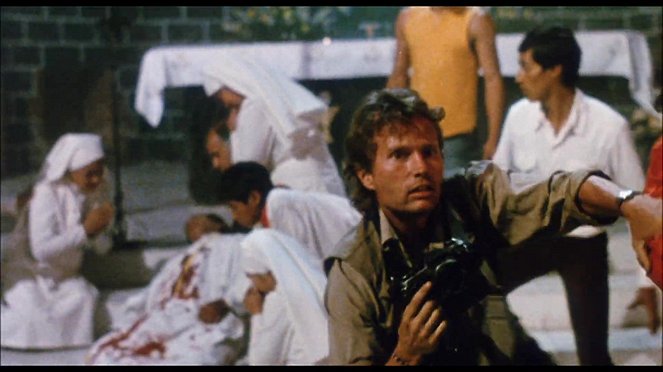Rendező:
Oliver StoneOperatőr:
Robert RichardsonZeneszerző:
Georges DelerueSzereplők:
James Woods, Jim Belushi, Michael Murphy, John Savage, Elpidia Carrillo, Tony Plana, Cynthia Gibb, Will MacMillan, Jorge Luke, Juan Fernández (több)Tartalmak(1)
A felkavaró politikai krimi - amelynek főszereplőjét és forgatókönyvíróit Oscar-díjra jelölték - az 1980-81-es salvadori polgárháborút idézi föl. Richard Boyle, a mindenre elszánt újságíró a helyszínről tudósít a Romero érsek meggyilkolásához vezető véres eseményekről. A frontvonalon saját szemével láthatja a Duarte elnök katonai rezsimje által irányított illegális halálbrigádok rémtetteit, a mészárlásokat és vérfürdőket. (AMC Hungary)
(több)Recenziók (3)
Chauvel's “War Reporter” meets Thompson's “Fear and Loathing in Las Vegas” in a somewhat very biased film. Had it been apolitical and impartial, it could have been better. But then it wouldn’t have been Stone.
()
Over time, it appears that the peak of Oliver Stone's films, in terms of quality, fell into the 80s, when he came up with two top-notch reflections on devastating wars. Platoon is more well-known and caused a greater impact overall, as Stone filmed it as a direct participant with deep knowledge of the subject. Regardless of perspective, the Vietnam War represented a more significant event and everyone formed their own relationship with it, both in the American and global public. The Salvadoran War remained in the shadow not only of the Vietnam War but also of the concurrently ongoing Iran-Iraq War, which involved a bloody struggle for oil fields. The civil war took place at a time when it clashed with the interests of American society. It was an era of economic growth, newfound confidence, and yuppies. Salvador was a sick country, where 27 families owned the majority of wealth and all political power, and they didn't want to allow any reforms. They collaborated with military leadership to eliminate the opposition or drive it toward illegality. American intelligence agencies were afraid of another embarrassment like Cuba and decided to prevent the regime's downfall at any cost. A wave of brutal violence swept through the country. Stone, as an anti-war activist whose political profile was shaped by the protest-filled 70s, followed the developments with concern and wanted to make a firsthand film with a political message. However, he couldn't find any producers, so the film was made out of enthusiasm and sacrifices from the entire film crew. Despite compromises due to a limited budget, they usually filmed on the first attempt, and the movie is filled with incredible passion. Salvador is not a cheap propaganda film, and its protagonist is not a likable character, but a complex figure. An unreliable and unstable adventurer prone to alcoholism, a leftist at heart but not driven by ideals, and someone who naturally sides with the weaker party in the conflict. At the same time, Stone pays tribute to the journalistic profession at a time when journalists were willing to risk their lives and go against the tide and expectations of the public and employers to pursue the truth. Boyle's colleague dies while attempting to capture the reality of a street battle from up close. A few years later, his colleagues in the Iraq war were satisfied with the official communication from the US army, impressive shots taken by army cameramen, and computer simulations, all from the comfort of a luxury hotel. Overall impression: 95%.
()
Oliver Stone here fully demonstrates his power, which lies in cruelty served quite raw. Sure, it could be even rougher, but still, you get the feeling that this is too realistic, that it could happen. In the end, it seems like the characters will be redeemed, but it's not as simple as it seems. Excellent conclusion and excellent progression.
()

